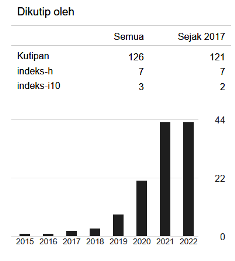Comparison of the Criteria for the Validity of Hadith in the View of the Khawarij and Sunni
Abstract
Keywords
Full Text:
PDFReferences
Amin, A. (t.th) al-Ahadits al-Musnadah al-Waridah fi al-Khawarij wa Shifatihim. T.tp: Maktabah al-Rusyd.
Aidan Ahmad al-Dailami, M. (2015). Al-Shahabah wa Makanatuhum ‘Inda al-Muslimin. Beirut: Dar al-Kutub al-‘Ilmiyyah.
Bus‘idi, S. (1998). Ruwwah al-Hadith ‘Inda al-‘Ibadiyyah. Tesis: Universitas Alu Bait.
Depag Republik Indonesia. (2015). Alquran dan Terjemahannya. Jakarta: DKU print.
Faisal, A. (1998). Qudumu Kataib al-Jihad li Gazwi Ahl al-Zindiqah wa Ilhad fi Masail al-I‘tiqad. Saudi Arabia: Dar al-Sami‘i.
Ghazali. (t.th). al-Mustafa min ‘Ilm al-Usul. Beirut: Muassasat al-Risalah.
Hanbal, A. (2001). Musnad Ahmad. T.tp: Muassasah al-Risalah.
Hilali, S. (2007). Keabsahan Hadis Ahad dalam Aqidah dan Hukum. Terj. Badru Salam, Roni Mahmuddin). Bogor: Pustaka Ulil Albab.
Isma‘il, M. (1995). Kaedah Kesahihan Sanad Hadis. Jakarta: Bulan Bintang.
Khathib, M. (2006). Ushul al-Hadits ‘Ulumuhu wa Mushthalatuhu. Beirut: Dar al-Fikr.
Kulsum, U. (2020). Konstalasi Islam Wasathiyah. Journal of Islamic Civiliztion. Vol. 2. No. I.
Kalsum Hasibuan, U. Suryadinata, S. (2018). Telaah Kitab Al-Sunnah Qabla Tadwin Karya M. Ajjaj Al-Khatib. Jurnal Ushuluna. Vo. 4. No. 2. Desember.
Musthafa, N. (2012). Oposisi Islam. Yogyakarta: LKIS.
Nasution, H. (2012). Teologi Islam. (Aliran-aliran Sejarah Analisa Perbandingan). Jakarta: UI Pres.
Nikmah, S. (2019). Epistemologi Hadis Dalam Perspektif Kelompok Syiah dan Khawarij. Jurnal Al-Mabhats. Vol. 4. No. 2.
Syahrastani, M. (2006). Al-Milal wa al-Nihal, Terj. Surabaya: Ibna Ilmu.
Saniah, M. Sidik, A. (2020). Pemikiran Khawarij: (Studi Historis Geneologis Pemikiran Islam). Jurnal Rusydiah. Vol. 1. No. 1. Juni.
Refbacks
- There are currently no refbacks.
Copyright (c) 2023 Syabrowi, Dkk..

This work is licensed under a Creative Commons Attribution-ShareAlike 4.0 International License.

This work is licensed under a Creative Commons Attribution-ShareAlike 4.0 International License
Turast: Jurnal Penelitian dan Pengabdian
Lembaga Penelitian dan Pengabdian (LPPM), Gedung Rektorat Lantai I
Kampus III Universitas Islam Negeri Imam Bonjol Padang - All rights reserved
Email: turast@uinib.ac.id



